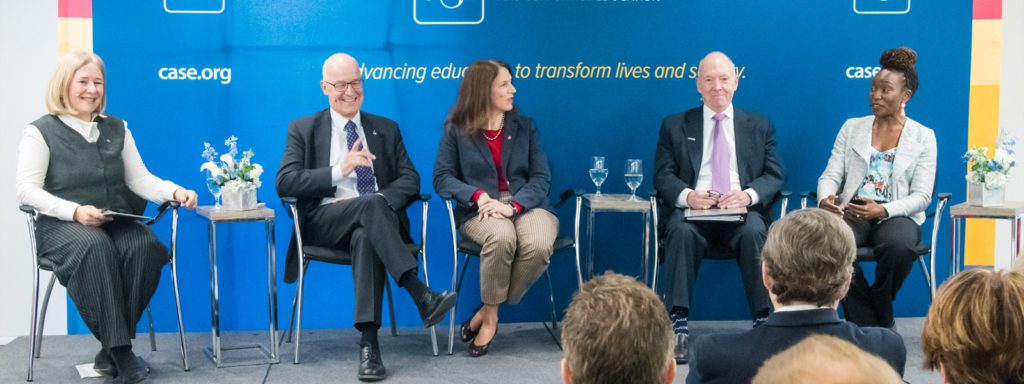IS members represent nonprofits, foundations, and corporations engaged in every kind of charitable endeavor, with missions that reflect the nearly infinite ways of working for the common good.
New member CASE is a global association for professionals in educational advancement – alumni relations, communications, development, marketing, and advancement services. CASE members represent more than 3,600 colleges, universities, independent schools, and arts organizations in more than 80 countries worldwide. CASE provides knowledge, standards, advocacy, and training designed to strengthen the efforts of the more than 90,000 professionals at CASE member institutions so they are better able to advance education to transform lives and society. We talked with Sue Cunningham, President and CEO of CASE.
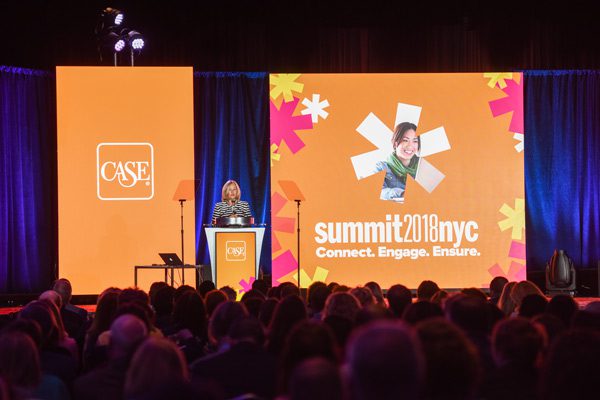
CASE President and CEO Sue Cunningham presenting in 2018.
Q: Tell us a little bit about your career path and how you arrived at your present position.
SC: I began my career in advancement at cultural institutions and then moved to higher education, first at the University of St. Andrews in Scotland. I am grateful that I discovered CASE at the beginning of my time at St. Andrews. I started off by attending CASE conferences and soon became a CASE volunteer, involved in delivering programs and helping develop new initiatives. I continued my involvement with CASE for 18 years as a member and volunteer, through my transition to the University of Oxford and then to the University of Melbourne in Australia.
CASE has been a mainstay for me throughout my career; when the opportunity arose to lead the organization I had come to love as a member, I couldn’t let it pass. CASE relies upon more than 4,000 volunteers each year to plan and speak at our conferences, to guide our many task forces and district and regional volunteer bodies, and to ensure CASE is providing the most current content and professional development for our 90,000 professionals across our 3,600 member institutions.
As a CASE participant and volunteer, I came to rely on the network of friends and colleagues I gained through CASE to help manage challenges and identify opportunities. This is the kind of organization CASE is: it connects people and helps them do their good work better. I am humbled and proud to be a part of this community.
Q: What does a typical day at CASE look like? Was there a day you remember that was extraordinary?
SC: We are headquartered in Washington, DC, and have offices in London, Singapore, and Mexico City. While there isn’t a regular pattern to my days, I generally have meetings and participate with our many, varied leadership and volunteer groups and task forces. I speak at conferences and other educational convenings. I interact with the Washington Higher Education Secretariat and similar bodies around the world.
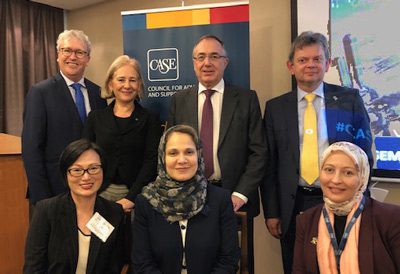
Other days, I’m connecting with members and our educational partners, who provide CASE and our members with valuable insights and financial support. One of my more extraordinary days recently was at our second Middle East Advancement Conference in Dubai. Just seeing the growing advancement community there was special. It was also inspiring to see the evolution of a group of professionals from different parts of Latin America at our recent annual meeting there. It’s exciting to see how regions like the Middle East, Latin America, and Asia Pacific are emerging in the development of the advancement profession in the way that the profession has grown in the US, Canada, and Europe. We also continue, after over 12 years, our work in Africa.
CASE is privileged to be part of this global knowledge transfer and sharing. And this transfer moves in all directions – we are learning from each other and apply that learning to our own institutions and local contexts.
Q: What are some of the challenges you face in your organization and how have you responded to them?
SC: The sheer breadth and depth of our membership can be a challenge, as it is sectorially and professionally diverse and geographically dispersed. However, our members have one commonality: they work to advance education to transform lives and society. They are committed to ensuring the good work occurring at their schools, colleges, and universities is known, celebrated, and supported. Our primary objective is in supporting our members through our program and service offerings. We work with our members to ensure that the message of the vitality of the nature of these institutions, and of education, is conveyed. We want to spread the message of how important they are for advancing an equitable, tolerant, and inclusive society.
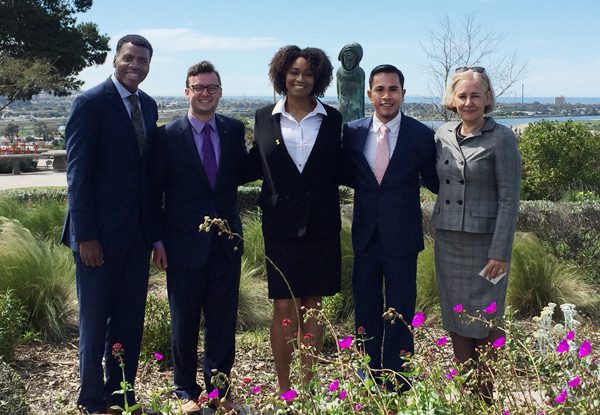
Q: What is one of your favorite places to be in your community?
SC: We have residency programs for recent graduates in the US, Australia, and the United Kingdom and an internship program for current students in the US and Canada. I enjoy connecting with our 100 interns and 30 residents. We offer regular webinars and virtual seminars to get to know each other. The energy and dedication among these young professionals is really remarkable. They are bright, dynamic people who are inspiring and impressive as they eagerly begin their advancement careers. CASE created these programs to build a pipeline of talented, diverse staff for the ever-growing profession. I very much enjoy being with them.
Q: Is there an unsung hero on your team or in your office you’d like to recognize?
SC: Every single member of our staff does an amazing job. My husband is incredibly supportive in that I travel a great deal. He is a teacher, so he understands how vital CASE is to education. The support I receive from him is invaluable. Our dog, Wombat, also provides me with considerable love and affection.
Q: Are there ways you encourage your members to follow good practices around ethics?
SC: CASE has long had a code of ethics for the profession. We are currently engaged in work to update our management standards and guidelines, as well as our overall talent management curriculum. Both of these efforts enable us to look afresh at the current state of education and how advancement practitioners can serve as leaders in the profession and across the educational institutions they serve.
In the context of the recent bribery scandal, CASE released a statement and provided support to our members. What happened, as we all know, was illegal and the universities were deemed to be victims of fraudulent activity. The scandal does present challenges about how people perceive higher education, which we are actively addressing. We repeatedly hear from members about the immense value they place on their relationship with CASE, because we are so committed to creating a better societal understanding of the value of higher education to transform lives and society.
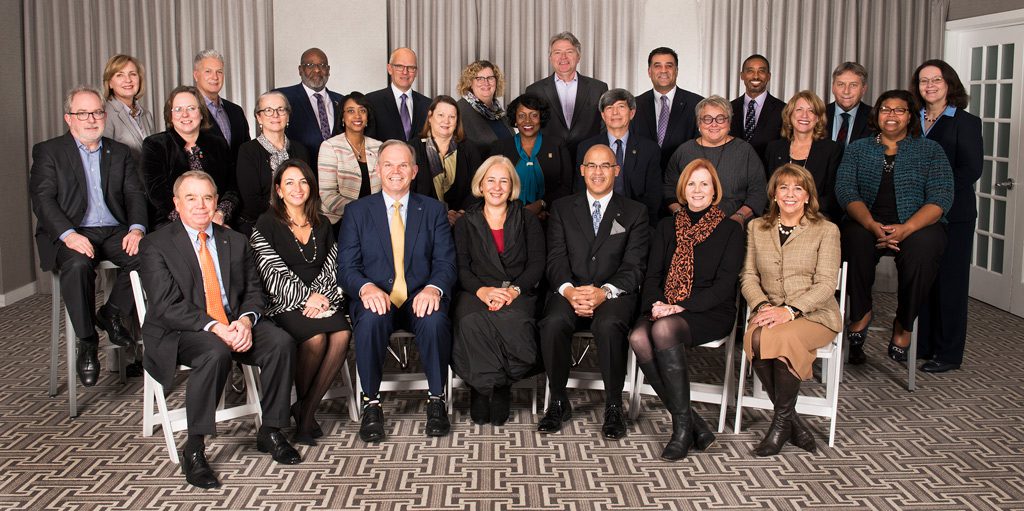
Q: Are there new areas of work or something coming up in the future that you’re excited about?
SC: We are midway through Reimagining CASE 2017 – 2021, our strategic plan. A significant aspect of the plan has been the refinement of our volunteer leadership structure. It is the first time in CASE’s 45-year history that such a significant change has been made in our governance. We have spent the last two years with volunteers and board members across our eleven fiduciary groups rethinking the structure to better serve our members moving forward. When the change is complete we will move from eleven fiduciary boards to one global board and a set of regional councils and district cabinets focused upon member engagement and service. It is an incredibly exciting, volunteer-driven journey. The new structure will go into effect in 2020.
Learn more about CASE at www.case.org.
Visit our members page to learn more about our members.
